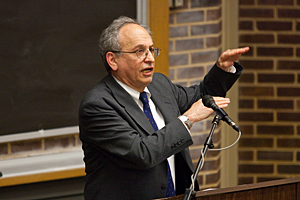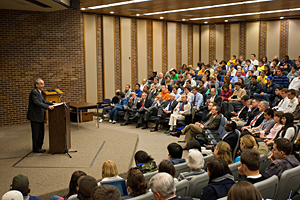
- Rozovsky wins prestigious NSF Early Career Award
- UD students meet alumni, experience 'closing bell' at NYSE
- Newark Police seek assistance in identifying suspects in robbery
- Rivlin says bipartisan budget action, stronger budget rules key to reversing debt
- Stink bugs shouldn't pose problem until late summer
- Gao to honor Placido Domingo in Washington performance
- Adopt-A-Highway project keeps Lewes road clean
- WVUD's Radiothon fundraiser runs April 1-10
- W.D. Snodgrass Symposium to honor Pulitzer winner
- New guide helps cancer patients manage symptoms
- UD in the News, March 25, 2011
- For the Record, March 25, 2011
- Public opinion expert discusses world views of U.S. in Global Agenda series
- Congressional delegation, dean laud Center for Community Research and Service program
- Center for Political Communication sets symposium on politics, entertainment
- Students work to raise funds, awareness of domestic violence
- Equestrian team wins regional championship in Western riding
- Markell, Harker stress importance of agriculture to Delaware's economy
- Carol A. Ammon MBA Case Competition winners announced
- Prof presents blood-clotting studies at Gordon Research Conference
- Sexual Assault Awareness Month events, programs announced
- Stay connected with Sea Grant, CEOE e-newsletter
- A message to UD regarding the tragedy in Japan
- More News >>
- March 31-May 14: REP stages Neil Simon's 'The Good Doctor'
- April 2: Newark plans annual 'wine and dine'
- April 5: Expert perspective on U.S. health care
- April 5: Comedian Ace Guillen to visit Scrounge
- April 6, May 4: School of Nursing sponsors research lecture series
- April 6-May 4: Confucius Institute presents Chinese Film Series on Wednesdays
- April 6: IPCC's Pachauri to discuss sustainable development in DENIN Dialogue Series
- April 7: 'WVUDstock' radiothon concert announced
- April 8: English Language Institute presents 'Arts in Translation'
- April 9: Green and Healthy Living Expo planned at The Bob
- April 9: Center for Political Communication to host Onion editor
- April 10: Alumni Easter Egg-stravaganza planned
- April 11: CDS session to focus on visual assistive technologies
- April 12: T.J. Stiles to speak at UDLA annual dinner
- April 15, 16: Annual UD push lawnmower tune-up scheduled
- April 15, 16: Master Players series presents iMusic 4, China Magpie
- April 15, 16: Delaware Symphony, UD chorus to perform Mahler work
- April 18: Former NFL Coach Bill Cowher featured in UD Speaks
- April 21-24: Sesame Street Live brings Elmo and friends to The Bob
- April 30: Save the date for Ag Day 2011 at UD
- April 30: Symposium to consider 'Frontiers at the Chemistry-Biology Interface'
- April 30-May 1: Relay for Life set at Delaware Field House
- May 4: Delaware Membrane Protein Symposium announced
- May 5: Northwestern University's Leon Keer to deliver Kerr lecture
- May 7: Women's volleyball team to host second annual Spring Fling
- Through May 3: SPPA announces speakers for 10th annual lecture series
- Through May 4: Global Agenda sees U.S. through others' eyes; World Bank president to speak
- Through May 4: 'Research on Race, Ethnicity, Culture' topic of series
- Through May 9: Black American Studies announces lecture series
- Through May 11: 'Challenges in Jewish Culture' lecture series announced
- Through May 11: Area Studies research featured in speaker series
- Through June 5: 'Andy Warhol: Behind the Camera' on view in Old College Gallery
- Through July 15: 'Bodyscapes' on view at Mechanical Hall Gallery
- More What's Happening >>
- UD calendar >>
- Middle States evaluation team on campus April 5
- Phipps named HR Liaison of the Quarter
- Senior wins iPad for participating in assessment study
- April 19: Procurement Services schedules information sessions
- UD Bookstore announces spring break hours
- HealthyU Wellness Program encourages employees to 'Step into Spring'
- April 8-29: Faculty roundtable series considers student engagement
- GRE is changing; learn more at April 15 info session
- April 30: UD Evening with Blue Rocks set for employees
- Morris Library to be open 24/7 during final exams
- More Campus FYI >>
4:29 p.m., April 21, 2009----The U.S. economy is now adjusting from a high consumption economy to one that is low on consumption and less reliant on foreign savings and borrowing to support consumption, Donald Kohn, vice chairman of the Federal Reserve Board, said at the University of Delaware on Monday, April 20.
Kohn, who spoke about "The Economic Outlook" during the University of Delaware's annual Hutchinson Lecture in macroeconomics, said the “difficult adjustment” will eventually provide better balance between U.S. production and consumption and lead to a healthier situation over time.
However, Kohn said that although the recessions that occurred between the end of World War II and the 1980s were typically followed by high-growth recovery phases that relatively quickly pushed output back up to its pre-recession level, recovery from the current recession is likely to be gradual.
“In the current episode, the imbalances preceding this contraction were substantial, and we are still dealing with the consequences of the developments that precipitated the downturn,” Kohn told an audience of about 300. “Accordingly, my best guess is that we are in for a relatively gradual recovery, though a very wide range of uncertainty surrounds that outlook.”
Kohn said some of the changes have already started taking shape in the way households spend money and save.
“Households were counting on the increase in the value of their homes to fund their retirement, kids' tuition, things like that,” Kohn said. “Now the values of their homes have gone down and they are going to have to refrain from consuming, do saving out of current income in order to build nest eggs.
“We've already seen the savings rate go from essentially zero to a little over 4 percent. It's likely that we'll continue to see a gradual increase in savings rate and that will hold down the growth rate of consumption relative to income,” Kohn said.
Kohn said that while it is difficult to predict how the adjustment process will play out, the U.S. financial system will eventually be on firmer footing, both markets and regulators will continue to press financial firms to employ less leverage and have more reliable sources of liquidity, and those firms will have every incentive to more effectively price, monitor, and manage risk.
Improvements to the supervisory and regulatory framework, he said, will help create a more stable financial system.
“In addition, we will have a stronger economy,” Kohn said. “Businesses will have boosted the efficiency of their operations. And households will be less indebted and saving more. That greater saving will, all else being equal, support greater investment or allow domestic saving to displace foreign saving for a more sustainable international position.
“The U.S. economy has proven itself over the years to be flexible and resilient as well as innovative and productive, qualities that enable it to rebound from serious economic shocks, and I am confident that, in a like manner, we will rebound from our current economic and financial challenges,” Kohn said.
In response to a question about the difference between the auto industry facing possible bankruptcy and the airline industry that survived similar restructuring, Kohn said the effect of a “sudden and disorderly problem in the auto industry” would compound the economic problems.
“I am hoping that the administration, the auto companies the suppliers, creditors can work out something that avoids the disorder that might happen, but at the same time helps to build automobile companies that are more viable and more vibrant and can participate in our economy in the future,” Kohn said.
Kohn was appointed to the board of governors of the Federal Reserve System in August 2002 for a full term ending Jan. 31, 2016. In June 2006, he was sworn in as vice chairman of the board for a four-year term.
Before becoming a member of the board, Kohn served on its staff as adviser to the Board for Monetary Policy, secretary of the Federal Open Market Committee, director of the Division of Monetary Affairs, and deputy staff director for monetary and financial policy. He also held several positions in the board's Division of Research and Statistics. Kohn received a doctorate in economics from the University of Michigan in 1971.
The Hutchinson Lecture series, which is sponsored by the Department of Economics in UD's Alfred Lerner College of Business and Economics, was established in 1990 to honor the distinguished academic career of the late Harry D. Hutchinson, a professor of economics who taught at UD from 1959-89.
Hutchinson received his doctorate in economics from the University of Michigan and worked at UD until his retirement. His career was distinguished by excellence in teaching and scholarship and his textbook, Money, Banking & The U.S. Economy, was the foundation for many students' introduction to financial institutions. Hutchinson died on July 28, 2005.
Article by Martin A Mbugua
Photo by Kevin Quinlan



